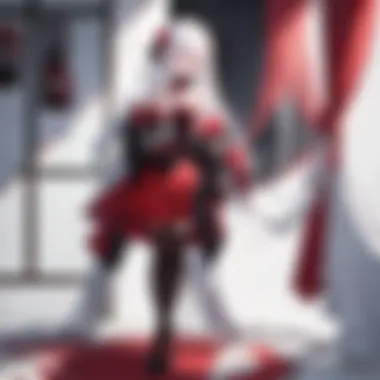Exploring Kaguya-sama: Love is War - English Dub Insights


Intro
Kaguya-sama: Love is War is not just another anime series; it represents a unique fusion of psychological warfare and romantic tension. The story unfolds at the prestigious Shuchiin Academy, where two brilliant students, Kaguya Shinomiya and Miyuki Shirogane, engage in a battle of wits. The underlying premise centers around their refusal to confess their feelings, as each character believes that the one who confesses first will experience defeat.
This article delves into the nuances of Kaguya-sama: Love is War, with a particular focus on its English dub adaptation. We will examine character dynamics, thematic depth, and the cultural relevance of the series, alongside an analysis of voice performance. Through this exploration, we aim to provide a well-rounded understanding of why Kaguya-sama resonates with fans across the globe.
Character Profiles
Overview of Main Characters
Kaguya Shinomiya presents as a poised and intelligent vice president of the student council, representing the upper echelon of society. Her background shapes her character, showcasing her strategic thinking and emotional complexities. Opposing her is Miyuki Shirogane, the president, who embodies hard work and determination. His meritocratic approach to success complements Kaguya’s privileged upbringing, setting a stage for their intricate relationship.
Both characters wield distinct personality traits that create a compelling narrative. Kaguya often resorts to cunning and deceptive tactics, while Miyuki balances his pride with genuine vulnerability.
Supporting Characters
Supporting characters like Chika Fujiwara and Yu Ishigami enrich the storyline, contributing to both humor and deeper insights into the protagonists' lives. Chika, the exuberant and carefree secretary, often unintentionally disrupts the tension between Kaguya and Miyuki, acting as a foil to their serious demeanor. On the other hand, Yu Ishigami brings a more subdued perspective, illustrating the struggles of adolescence beyond romantic tensions.
Theme Exploration
Central Themes
At its core, Kaguya-sama: Love is War explores themes of love, pride, and the complexities of relationships. The series captures the essence of romantic rivalry but also highlights the emotional barriers that individuals build. It questions the nature of vulnerability and pride, making viewers reflect on their perceptions of relationships.
Cultural References
The show integrates various cultural references, from societal expectations to the intricacies of modern-day romance. The dialogue often reflects a blend of humor and intelligence, allowing the audience to grasp deeper meanings beyond the surface-level rivalry.
Popular Series and Recommendations
Top Anime Series of the Year
In conjunction with Kaguya-sama, there are notable series worth exploring. Consider watching:
- Jujutsu Kaisen: Engaging action with rich character development.
- Attack on Titan: A gripping narrative with political themes.
- Demon Slayer: Stunning visuals and heartfelt storytelling.
Hidden Gems in Manga
For those who appreciate the intricacies of manga, recommendations include:
- Kaguya-sama: Love is War (manga) - The original source material offers deeper insights into characters.
- March Comes in Like a Lion: A profound exploration of mental health intertwined with the game of shogi.
Kaguya-sama: Love is War stands out because of its unique spin on romance and intellect. By examining its characters, themes, and cultural impact, we highlight what makes this anime a cherished title in the anime community.
"In a world where love is a battlefield, the victor is the one with the strongest resolve."
This exploration aims to arm both new and seasoned viewers with the knowledge to appreciate every nuance of the series.


Prelims to Kaguya-sama: Love is War
Kaguya-sama: Love is War stands as a remarkable entry in the realm of anime, attracting both fresh audiences and seasoned fans alike. This series blends humor and romance with rivalry in a student council setting. An analysis of this subject illuminates the core dynamics that drive the narrative and its characters.
Understanding why Kaguya-sama: Love is War captivates viewers requires examining several elements. The strong character development and witty dialogue contribute to its uniqueness. The series challenges traditional romantic tropes while incorporating psychological twists that resonate with viewers. As a result, the show invites a deeper exploration of its themes and characters.
Overview of the Series
Kaguya-sama: Love is War originated as a manga created by Aka Akasaka. The anime adaptation premiered in January 2019, quickly gaining momentum. It explores a love story set within a prestigious high school, focusing on two top students, Kaguya Shinomiya and Miyuki Shirogane. Both characters are too proud to confess their feelings, prompting extravagant mind games to compel the other to admit love first.
The series uniquely portrays love as a battleground, where conflicts often turn into comical yet intense confrontations. Viewers are drawn to the clever writing, which artfully balances tension and levity. The voice acting in the English dub, particularly, complements the character dynamics, offering an accessible experience to a broader audience.
Brief History and Reception
Since its inception, Kaguya-sama: Love is War has received considerable acclaim. The manga has won various awards, including the prestigious Manga Taisho Award in 2019. The anime adaptation further solidified its position, often praised for its animation quality and direction.
Reception among fans and critics reflects its substantial impact. Many discussions on platforms like Reddit highlight its clever storytelling and character relatability. The English dub has opened new pathways for viewers less acquainted with subtitles, enhancing its reach. Overall, the combination of art, story, and humor creates an enduring appeal in the anime community.
"Kaguya-sama: Love is War is not just about love; it's a psychological chess match that intrigues the viewer beyond the surface."
This intricate interplay of characters and themes sets the foundation for deeper analysis, exploring the unique aspects that define Kaguya-sama: Love is War.
Understanding the Characters
Understanding the characters in Kaguya-sama: Love is War is vital for comprehending the deeper layers of this series. Each character exhibits distinct personalities and motivations that contribute to the ongoing themes of love, competition, and psychological manipulation. This examination reveals how the characters’ interactions build tension and humor, making the anime engaging and relatable for viewers. Additionally, recognizing character arcs and development is essential for appreciating the narrative’s evolution throughout both seasons.
Kaguya Shinomiya: The Ambitious Vice President
Kaguya Shinomiya embodies ambition and intellect, serving as the Vice President of the student council. Her character is defined by her high social status and family background. Kaguya projects an image of confidence, yet beneath this veneer lies insecurity and fear of vulnerability. She is depicted as fiercely competitive, particularly in her romantic pursuit of Miyuki Shirogane. Her methods often involve complex psychological tactics. These intricacies present viewers with a character that is both relatable and unpredictable. Kaguya’s struggles resonate with many individuals who face similar dilemmas in their relationships.
Miyuki Shirogane: The Overachieving Student Council President
Miyuki Shirogane represents the archetype of the overachiever. His dedication to excellence in academics and leadership is inspiring yet pressures him. Like Kaguya, he grapples with his emotions and personal insecurities, particularly regarding his feelings for Kaguya. His role as President obliges him to maintain a facade of composure. However, the vulnerabilities he displays add depth to his character. This dynamic creates an interesting interplay between him and Kaguya, pushing the narrative forward in a compelling manner. The evolution of his relationship with Kaguya serves as the heart of the show.
Supporting Characters: A Crucial Role
Supporting characters in Kaguya-sama: Love is War significantly impact the story, enriching the main narrative with diverse perspectives and themes.
Kaguya's relationship with her family
Kaguya's relationship with her family illustrates her internal conflicts. Her family puts immense pressure on her to uphold the family’s prestigious image. This aspect contributes to her isolated feelings, making her character more relatable. Kaguya often feels torn between her family expectations and her desire for genuine connections. This internal struggle is a relatable theme for many, which adds to Kaguya's emotional depth. The complexity of her family dynamics features prominently in her developmental arc and enriches the storytelling.
Miyuki's closest friends
Miyuki’s closest friends offer a lens into his character outside of his role as president. They not only provide comedic relief but also serve as a contrast to his serious nature. Their different perspectives help him navigate his challenges, particularly in matters of the heart. The friendship dynamics emphasize themes of loyalty and support. They also highlight Miyuki's growth as he learns to balance his responsibilities with personal relationships. This contributes to his character's development while further engaging the audience.
Supporting characters like Kaguya’s and Miyuki’s friends are pivotal in revealing the protagonists' vulnerabilities, making the narrative multifaceted.


Themes in Kaguya-sama: Love is War
In exploring the series Kaguya-sama: Love is War, understanding its themes is crucial. The narrative goes beyond romantic comedy. It delves deeply into the complexities of relationships, highlighting competition's surprising role in love. Each theme weaves into the fabric of the story, enriching character interactions and adding layers of meaning.
The Nature of Love and Competition
At the core of the series is the intrinsic link between love and competition. Kaguya and Miyuki engage in a continual battle of wits. Each one tries to gain the upper hand over the other. This dynamic reflects a broader truth about romantic relationships. Often, love can feel like a contest, where both individuals strive to prove their worth.
The series cleverly illustrates that love is not just about affection. It also involves strategy, vulnerability, and risk. The playful and sometimes serious methods by which Kaguya and Miyuki seek to outsmart each other showcase love's complexities.
Ultimately, this competition becomes a means of growth. Both characters evolve as they navigate their feelings. Their rivalry leads them to confront their insecurities and desires. This stem of competition might seem trivial at times, but it holds significant weight in their emotional journey.
Psychological Warfare in Romance
Kaguya-sama also presents psychological warfare as a hallmark of its storytelling. The term suggests a battle fought not with physical force but with mental strategies. Kaguya and Miyuki’s interactions exemplify this through intricate plots and schemes. Each character employs cunning tactics to gain emotional leverage over the other.
The mind games they play reflect a deeper exploration of human emotions. They reveal fears, biases, and expectations that define their relationship. Conflicts arise from misunderstandings, and characters’ reluctance to express their true emotions leads to comedic yet poignant situations.
Moreover, this theme serves to illustrate the lengths to which people go for love. The series shows that this can be both humorous and damaging. The conflict becomes relatable as viewers observe the characters’ struggles. Their emotional experiences resonate, making the theme evocative.
Social Dynamics Among Youth
Another significant theme in Kaguya-sama: Love is War is the social dynamics among youth. Set in a high school, the series captures the adolescent experience with precision. It showcases the challenges that teens face while forming identities and navigating relationships.
The characters exist within a rigid social hierarchy. This aspect influences their actions and interactions considerably. Kaguya, for example, is a wealthy and prestigious vice president, while Miyuki embodies hard work and determination. These distinctions shape their worldview and contribute to the tension between them.
The supporting cast also represents varied facets of youth culture. Their relationships offer commentary on friendship, loyalty, and social pressure. These dynamics contribute to the overall narrative, emphasizing that adolescence is complex and multifaceted.
As viewers, we see how these elements build connections among the characters. Understanding their interactions enhances the appreciation of the series. Overall, Kaguya-sama effectively mirrors the intricacies of young love and social dynamics, making it resonate with its audience.
Analysis of the English Dub
The analysis of the English dub of Kaguya-sama: Love is War is crucial in understanding how localization affects viewer experience. The voice acting, cultural adjustments, and the relationships between the original and the dubbed versions all contribute significantly to how audiences receive the series. Analyzing these aspects reveals the complexities involved in adapting a Japanese anime for a Western audience. It also sheds light on how voice performances can either enhance or detract from the original intent of the series. The importance of high-quality localization cannot be overstated, as it often determines the accessibility and overall enjoyment of the content.
Voice Acting Choices
Voice acting in Kaguya-sama: Love is War sets the tone for the characters and their dynamics. The English voice actors have made deliberate choices that reflect their characters’ personalities. For instance, Kaguya's voice actress, Alexis Tipton, delivers a performance that embodies the character's refined yet conflicted nature.
- The nuances in inflection convey her inner turmoil effectively.
- Similarly, Makoto Furukawa’s portrayal of Miyuki Shirogane brings a sense of seriousness, counterbalanced by comedic moments that make the character relatable.
Choosing the right voice actors for specific roles brings authenticity. These decisions often resonate with the audience, allowing them to connect with the characters more deeply. The success of the dub relies heavily on these choices, underscoring the significance of skilled voice performances in animation.
Cultural Adaptation and Localization
Cultural adaptation is where the English dub can either succeed or fail. Kaguya-sama: Love is War incorporates various cultural references that may not resonate with Western viewers. The localization team worked to adjust these references while maintaining the essence of the story. This involves modifying dialogue, humor, and context without altering the narrative's core message.
- Some Japanese cultural norms may be less familiar to Western audiences. Thus, effective localization requires an understanding of both cultures to ensure the humor and emotional beats translate.
- The subtleties of high school life in Japan provide a rich backdrop, but in the English dub, adjustments make it relatable to an American audience.


Adaptation does not simply mean translation; it means conveying the original feelings while ensuring clarity for viewers who may not understand the local context.
Comparisons with the Original Japanese Version
When comparing the English dub to the original Japanese version, distinct differences often emerge. The tone, pacing, and emotional delivery can vary significantly, impacting how the story unfolds. While the original cast may deliver a performance steeped in cultural specificity, the English voice actors focus on universality that can resonate with broader audiences.
- Original versions often carry nuances that are directly tied to the Japanese language’s intonations and expressions. The English dub may lose some subtleties but compensates with comedic timing familiar to Western humor.
- Fans often debate which version provides a more authentic experience. The answer is often subjective, depending on personal taste and familiarity with either language.
Impact on Anime Culture
The anime series Kaguya-sama: Love is War has a significant influence on contemporary anime culture. This section addresses various ways this show contributes to the broader landscape of anime. Notably, it reinforces familiar tropes in romantic comedy while engaging the audience in new ways. These elements enhance its appeal not just among avid fans, but within the larger shift of popular culture.
Reinforcement of Romantic Comedy Tropes
Kaguya-sama: Love is War creatively employs and reinforces the already established romantic comedy tropes. The central premise of two characters engaging in a battle of wits and psychological games around love adds a layer of depth. This material not only draws in the audience but also examines the nuances of love, competition, and pride.
Audiences have come to expect certain dynamics in romantic comedies, such as miscommunication, rivalries, and evolving relationships. Kaguya-sama does not shy away from these aspects. Instead, it pushes them further, allowing for character growth while still adhering to genre conventions.
- The repeated "who will confess first" theme highlights the tension many can relate to in their own experiences of love.
- Characters often find themselves in over-the-top situations that showcase their personalities and vulnerabilities, which can resonate deeply.
Community and Fandom Engagement
This anime has sparked considerable interest and formed a vibrant community. Fans have taken to various platforms to discuss not only the series but also its cultural implications. Engagement manifests in numerous ways, including fan art, discussions in forums, and social media sharing. This kind of community interaction fosters a sense of belonging among fans, encouraging them to share their interpretations and build friendships.
Kaguya-sama: Love is War provides material rich for analysis. Discussions range from character motivations to thematic undertones. It draws in viewers who enjoy dissecting episodes and expressing their insights, which ultimately strengthens the connection with the series. For example, Reddit threads often dive deep into the psyche of Kaguya and Miyuki, analyzing their relationship and behaviors in a way that encourages thoughtful dialogue.
Merchandising and Cultural Influence
Merchandising plays a crucial role in embedding Kaguya-sama into the anime culture. Products range from figurines to clothing, creating tangible connections for fans. The popularity of merchandise strengthens the interest in the series, and thus encourages new viewers to explore it. This commercial aspect mirrors the series’ impact and visibility in mainstream culture.
The series has also inspired various collaborations, influencing other media and even events in the anime community. For instance, some conventions may feature themed panels or guest speakers discussing Kaguya-sama as part of their program. This cross-pollination cultivates further interest in the anime, leading to its significance as a cultural touchstone.
Ultimately, Kaguya-sama: Love is War is not just a series for entertainment; it has become a key player in shaping modern anime culture. Through its reinforcement of tropes, community engagement, and culture-driven merchandising, the anime reaches audiences on multiple levels, cementing its relevance in an ever-evolving landscape.
"Kaguya-sama has redefined what it means to blend humor and emotional depth in a romantic setting, resonating with audiences globally."
By understanding these facets, fans appreciate how Kaguya-sama: Love is War fosters a richer and more interconnected anime culture.
Closure
The conclusion serves as a critical reflection on Kaguya-sama: Love is War. This series embodies unique elements of storytelling and character development. It reinforces the complexity of romantic narratives, illustrating how love and rivalry butt heads within a high-stakes environment. The careful exploration of these themes enhances viewers' engagement. Moreover, the blend of humor and psychological insight makes the series notable.
Final Thoughts on Kaguya-sama: Love is War
The depth of Kaguya-sama is not just in its romantic comedy facets but also in the portrayals of its characters. Kaguya and Miyuki each represent different views on love, ambition, and personal growth. Their interactions are not merely comedic devices, rather they reflect deeper emotional struggles that resonate with the audience. Audiences appreciate the layers presented in these characters, making them relatable. Each episode builds upon insecurities, ambitions, and misunderstandings, bringing forth a multifaceted view of young love.
Furthermore, the writing often encourages viewers to reflect on their own experiences. This relatability contributes to the show's enduring appeal. The relationship between Kaguya and Miyuki can be seen as a more profound commentary on communication and the barriers people create, both in romantic relationships and friendships alike. The brilliance of the series lies within its ability to entertain while simultaneously prompting deep contemplation amongst its audience.
Future of the Series
Considering the trajectory of Kaguya-sama: Love is War, it shows potential for continued success. The forthcoming content has room to explore new dynamics, perhaps introducing additional characters or developing existing ones further. The approach to storytelling can evolve and adapt, promising fresh narratives while retaining the elements that viewers have come to love.
Moreover, the current trends in anime consumption suggest a growing appetite for series that challenge traditional tropes. Kaguya-sama has established itself as a front-runner in that regard. Its impact is not only evident in viewership but also in merchandise and fandom engagement. As new seasons and adaptations come forth, the series can deepen its cultural impact. The exploration of topics such as mental health and relationship dynamics within a comedic framework can resonate well with younger viewers.
In summary, while Kaguya-sama: Love is War has made its mark, there remains the promise of further exploration into the lives of its characters and the themes they embody. As the anime landscape evolves, Kaguya-sama stands poised to continue its influence, making it a significant piece within the broader context of animated storytelling.







